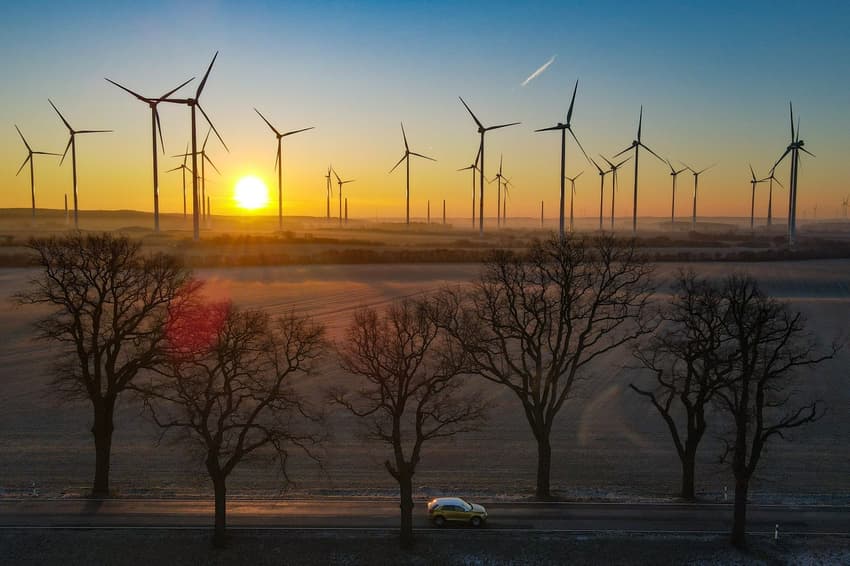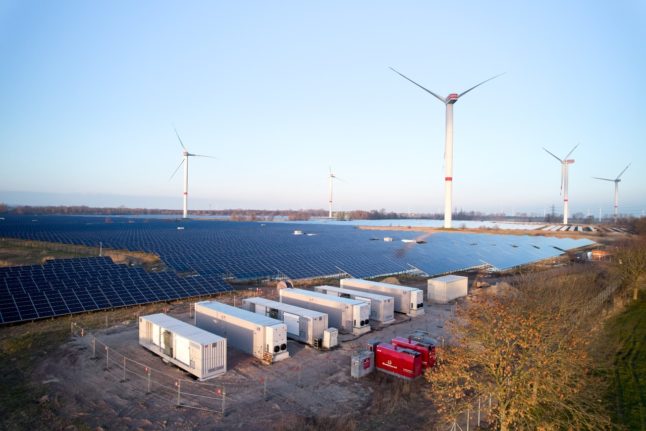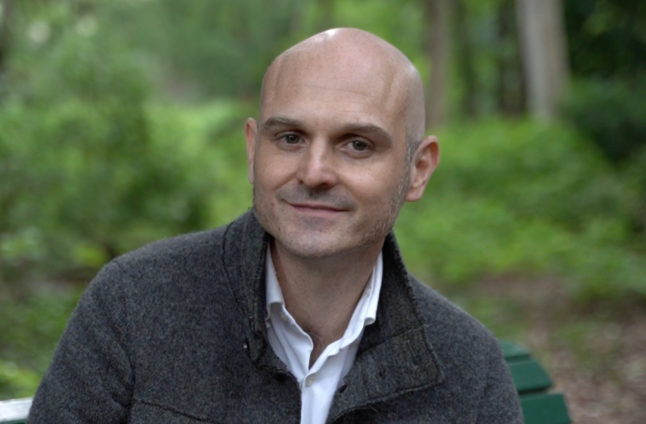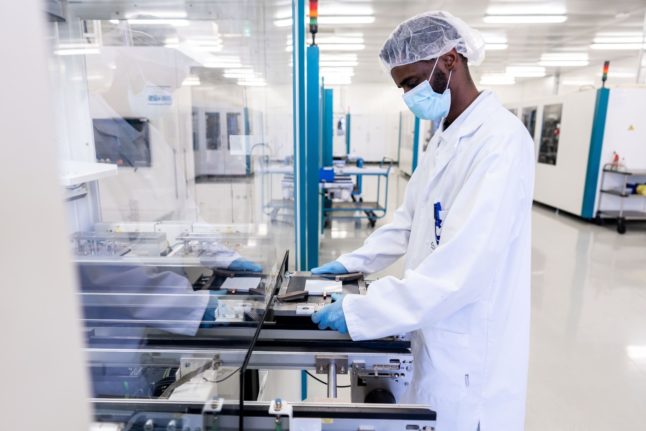How one German company wants to plug the skilled worker gap in green tech

Jerome Goerke recently founded greentech.training, a small business company hoping to address the skilled labor shortage that is hindering Germany’s green energy transition.
Der Fachkträfetmangel: it’s a menacing word (translating roughly to skilled labour shortage) and one with equally menacing effects for Germany’s economy.
According to the Labour Ministry, Germany will face a shortfall of 240,000 skilled workers by 2026, and the issue has prompted the federal government to launch new policies aimed at recruiting more foreign workers.
The shortage is particularly problematic for companies hoping to power the country’s energy transition, as there is currently a lack of the skilled workers (particularly electricians, electrical engineers, and IT specialists) needed to grow the country’s renewable energy industries.
Jerome Goerke, founder of greentech.training, is intimately familiar with this issue. His company, launched in January, aims to address this shortage by making it easier for German companies involved in the energy transition to identify and hire qualified renewable energy workers, particularly those living in other countries.
Goerke, a journalist and communications expert by trade who moved from Australia to Germany almost twenty years ago, said the inspiration for starting this company arose during the Covid pandemic, as he began recognising the severity of climate change.
“There is this drive, I think, amongst many people at the moment to say, what can I do, how can I contribute to minimizing climate change? How can I actually do something that allows the next generation to benefit from my actions?” Goerke explained.
READ ALSO: '600,000 vacancies': Why Germany's skilled worker shortage is greater than ever
As the combined forces of the pandemic, climate change, and war in Ukraine plunged Europe into an energy crisis, Goerke put his focus on green energy. Since last April, Goerke has been meeting with people involved in the hydrogen, solar, and wind industries to determine what challenges these industries faced.
In these conversations, one issue came up repeatedly: “time and again, it was skills. You know, we need people with skills. And they’re not there,” Goerke said.
A major obstacle in addressing this shortage lies in the bureaucracy associated with recruiting skilled international workers to Germany, as potential immigrants often face complicated documentation processes and a language barrier.
“All this kind of stuff is a hassle. And it’s a preventive issue for many companies who would like to take people on,” Goerke said.
That is where greentech.training comes in.
“Everything that is normally associated with the difficulty of taking internationals, we deal with. So that’s our kind of niche.” Goerke explained, adding that their services also appeal to immigrants already living in Germany, who despite having the necessary skills to enter the sector face bureaucratic hurdles as well.
READ ALSO: Will immigration reform be enough to combat Germany’s worker shortage?
How it works
The company’s name stems from the term “green technician,” which Goerke explains describes those qualified to work in the renewable energy fields. To build a pool of these green technicians, greentech.training first formed partnerships with green energy cluster networks such as European Solar PV Industrial Alliance (ESIA), the Windenergie Agentur (WAB), and the Berlin Solar City Master Plan. They then worked with the companies in these clusters to determine what positions they are hiring for.
So far, greentech.training is sourcing jobs in forty professions across the solar, wind, hydrogen, and geothermal energy sectors.
“You [can] apply through the job portal on our page, and say, ok, I’m an automation engineer, and [the portal] is structured in a way that it says, on behalf of the cluster partners, we are sourcing automation engineers,” Goerke explained. “[The applicants] see the basic requirements and then submit the CV.”
Since launching in January, the company has received around 550 applications, which Goerke and the seven other volunteers who make up the company are sifting through.

A wind and solar farm in Büttel, Schleswig-Holstein. Photo: picture alliance/dpa/ENERPARC AG | ENERPARC AG
Over half of the applications so far came from people living in Germany, many of whom had immigrated from other countries, while the other half came from people from around the world, living in countries such as India, Mozambique, and England.
“We are selective. We’re not going to [accept] everybody who applies, because we know that this holistically must function. So part of our job is also to make sure we only present [qualified] people,” Goerke said.
Applicants that the greentech.training team determines have the necessary education and qualifications for their preferred position move on to the next stage in the process. What that stage entails is determined by their level of German, as around 90 percent of the companies require German at a level of B1.2 or higher.
Those applicants not yet at that level enter greentech.training’s Bridging Program, through which they enroll in a virtual, intensive German course taught by a freelance language trainer. Goerke emphasizes that while the courses are relatively cheap, at €199 for 75 units (with 450 units required to go from no German to B1.2), he hopes they can be free in the future.
READ ALSO: Chancenkarte: How many points could you get on Germany's planned skilled worker visa?
“We don’t want to charge the green technician, we just want to give them a hand up,” he said.
Once the applicant has reached the necessary German level, they are asked to upload a video of themselves explaining their skills background, which greentech.training then circulates to partner companies interested in hiring for the specific position.
If the partner company expresses interest in the applicant, the applicant then goes through a traditional recruitment process with the company. If the company hires the applicant (in which case greentech.training receives a sourcing fee), greentech.training also helps on the backend.
If necessary, they provide support for visa applications and professional certifications, while also helping the applicants get settled in their new environment by connecting them with community support groups.
“The idea is that from beginning to end, we’re serving both the green technicians coming into the companies and also the green energy companies themselves, making sure that they get them and then they keep them. Because we want long term interconnection,” Goerke said.

Founder Jerome Goerke. Photo: Lara Bommers
Recruiting young internationals
To help draw potential applicants to their program, greentech.training is also planning on-the-ground recruiting events. They have formed partnerships with universities in Turkey, Kazakhstan, Tunisia, Spain, and Jordan, where they plan to host green energy career days in the next few months.
A main goal of these recruiting events is to present young people with a pathway into green energy, Goerke said. The company hopes that the use of the term “green technician” to describe these jobs will facilitate these efforts. While the term is new and relatively unknown, Goerke thinks it will help draw young workers.
“It’s an umbrella term, a catch all term, but it does help stand out in the crowd because people see that and think yeah, that’s who I am, this is who I want to be,” he said. “A big component of our work is to help make that pathway clear.”
Goerke says the term is also helpful because it demonstrates that the distinction between “white collar” and “blue collar” positions will soon become irrelevant in the green energy sector.
“In the future for energy you need to be both technically, mechanically, and intellectually agile. So there’s going to be a blending of these two old worlds. And the best way to think of that is as a green technician,” he said.
To this end, the company is also looking to partner more with trade schools, as in addition to electricians, welders (for wind turbine manufacturing) and roofers (for solar panel installation) are in high demand.
READ ALSO: Climate change the 'biggest worry' for people in Germany
Recruiting refugees
Goerke is also aware of the need to involve all segments of the community in the energy transition, an understanding that informs the company’s focus on fostering a community-integrated approach to the green energy transition.
“Energy affects all of us, [and] the communal approach, unified approach to making this transition happen is essential. We can’t leave people behind,” he said. “If you don’t have the community’s support for any kind of initiative, you risk losing their involvement. And it’s important to work at a very grassroots level.”
For greentech.training, part of this grassroots work means recruiting from refugee communities, allowing those from marginalized backgrounds who don’t yet have a “green technician” background to enter the sector as well.
For example, the company is poised to launch the Propulsion Program, a small-scale initiative targeted at young refugees between the ages of 16 and 26 in the Bremen/Bremerhaven area. The program is designed to offer a pathway for manual trades in the wind sector, with those selected enrolling in a free German course before taking on an internship with a partner company. Goerke estimates there will be ten to fifteen positions available.
Goerke believes the program can be specifically helpful for refugees who were in Ukraine at the time of the Russian invasion, but are not Ukranian or EU citizens, making access to work more difficult.
“This is a key segment of the community that we would like to take care of and support,” he said.
The application process is similar to that of greentech.training’s main program. After connecting with greentech.training through their social service partner in the area, the applicant submits a video explaining their background, which greentech.training then sends to the partner companies. If the applicant is chosen, they then enroll in the German course before beginning their internship.
Greentech.training has plans to expand these refugee recruiting efforts, as they recently agreed a partnership with the Berlin-based organization Einstieg zum Aufstieg GmbH to help create opportunities for refugees in Berlin to enter the green energy market.
READ ALSO: PODCAST: Is Germany really one of the hardest countries to start a new life in?
What's next?
The main challenge that Goerke and greentech.training face in the future is ensuring the business remains viable as it moves out of the launch phase.
“You can have a great idea, but until people start paying for it, that’s when your service is validated, and that’s when you can start generating income for the people who are helping. So that’s the ongoing challenge,” Goerke explained.

A technician looks at a lithium battery in a lab. Photo: picture alliance/dpa/CUSTOMCELLS® | Markus Schwer
Goerke said he is weighing the options of going the venture capital route or letting the business grow organically, and is even open to a partnership with a governmental organization. Ultimately, though, Goerke is not too concerned with how the business ends up being structured. His main priority is to ensure that the company continues to provide a valuable service which allows people from all backgrounds to contribute to the energy transition.
“Let’s just offer a good service, let’s focus on really servicing both the green technicians, those who want to be green technicians, and the companies,” he said.
Banner ad
“It doesn’t even matter what business model we have. All that matters [is] that these individuals have the ability to become green technicians, to be green technicians, and then to answer that question in five years’ time: ‘I’m a green technician.’ ‘Oh what kind?’”
Indeed, for Goerke, the increase in the prevalence of the term green technician will be a measure of the company's success.
“Because I know that that has all kinds of knock on effects. It means less carbon in the atmosphere, it means security for that individual who might have come from a war torn area or [a] developing country, who can take that knowledge back to their country one day, to help redevelop that country, to continue the development towards renewables [and] a cleaner, sustainable Earth.”
Comments
See Also
Der Fachkträfetmangel: it’s a menacing word (translating roughly to skilled labour shortage) and one with equally menacing effects for Germany’s economy.
According to the Labour Ministry, Germany will face a shortfall of 240,000 skilled workers by 2026, and the issue has prompted the federal government to launch new policies aimed at recruiting more foreign workers.
The shortage is particularly problematic for companies hoping to power the country’s energy transition, as there is currently a lack of the skilled workers (particularly electricians, electrical engineers, and IT specialists) needed to grow the country’s renewable energy industries.
Jerome Goerke, founder of greentech.training, is intimately familiar with this issue. His company, launched in January, aims to address this shortage by making it easier for German companies involved in the energy transition to identify and hire qualified renewable energy workers, particularly those living in other countries.
Goerke, a journalist and communications expert by trade who moved from Australia to Germany almost twenty years ago, said the inspiration for starting this company arose during the Covid pandemic, as he began recognising the severity of climate change.
“There is this drive, I think, amongst many people at the moment to say, what can I do, how can I contribute to minimizing climate change? How can I actually do something that allows the next generation to benefit from my actions?” Goerke explained.
READ ALSO: '600,000 vacancies': Why Germany's skilled worker shortage is greater than ever
As the combined forces of the pandemic, climate change, and war in Ukraine plunged Europe into an energy crisis, Goerke put his focus on green energy. Since last April, Goerke has been meeting with people involved in the hydrogen, solar, and wind industries to determine what challenges these industries faced.
In these conversations, one issue came up repeatedly: “time and again, it was skills. You know, we need people with skills. And they’re not there,” Goerke said.
A major obstacle in addressing this shortage lies in the bureaucracy associated with recruiting skilled international workers to Germany, as potential immigrants often face complicated documentation processes and a language barrier.
“All this kind of stuff is a hassle. And it’s a preventive issue for many companies who would like to take people on,” Goerke said.
That is where greentech.training comes in.
“Everything that is normally associated with the difficulty of taking internationals, we deal with. So that’s our kind of niche.” Goerke explained, adding that their services also appeal to immigrants already living in Germany, who despite having the necessary skills to enter the sector face bureaucratic hurdles as well.
READ ALSO: Will immigration reform be enough to combat Germany’s worker shortage?
How it works
The company’s name stems from the term “green technician,” which Goerke explains describes those qualified to work in the renewable energy fields. To build a pool of these green technicians, greentech.training first formed partnerships with green energy cluster networks such as European Solar PV Industrial Alliance (ESIA), the Windenergie Agentur (WAB), and the Berlin Solar City Master Plan. They then worked with the companies in these clusters to determine what positions they are hiring for.
So far, greentech.training is sourcing jobs in forty professions across the solar, wind, hydrogen, and geothermal energy sectors.
“You [can] apply through the job portal on our page, and say, ok, I’m an automation engineer, and [the portal] is structured in a way that it says, on behalf of the cluster partners, we are sourcing automation engineers,” Goerke explained. “[The applicants] see the basic requirements and then submit the CV.”
Since launching in January, the company has received around 550 applications, which Goerke and the seven other volunteers who make up the company are sifting through.

Over half of the applications so far came from people living in Germany, many of whom had immigrated from other countries, while the other half came from people from around the world, living in countries such as India, Mozambique, and England.
“We are selective. We’re not going to [accept] everybody who applies, because we know that this holistically must function. So part of our job is also to make sure we only present [qualified] people,” Goerke said.
Applicants that the greentech.training team determines have the necessary education and qualifications for their preferred position move on to the next stage in the process. What that stage entails is determined by their level of German, as around 90 percent of the companies require German at a level of B1.2 or higher.
Those applicants not yet at that level enter greentech.training’s Bridging Program, through which they enroll in a virtual, intensive German course taught by a freelance language trainer. Goerke emphasizes that while the courses are relatively cheap, at €199 for 75 units (with 450 units required to go from no German to B1.2), he hopes they can be free in the future.
READ ALSO: Chancenkarte: How many points could you get on Germany's planned skilled worker visa?
“We don’t want to charge the green technician, we just want to give them a hand up,” he said.
Once the applicant has reached the necessary German level, they are asked to upload a video of themselves explaining their skills background, which greentech.training then circulates to partner companies interested in hiring for the specific position.
If the partner company expresses interest in the applicant, the applicant then goes through a traditional recruitment process with the company. If the company hires the applicant (in which case greentech.training receives a sourcing fee), greentech.training also helps on the backend.
If necessary, they provide support for visa applications and professional certifications, while also helping the applicants get settled in their new environment by connecting them with community support groups.
“The idea is that from beginning to end, we’re serving both the green technicians coming into the companies and also the green energy companies themselves, making sure that they get them and then they keep them. Because we want long term interconnection,” Goerke said.

Recruiting young internationals
To help draw potential applicants to their program, greentech.training is also planning on-the-ground recruiting events. They have formed partnerships with universities in Turkey, Kazakhstan, Tunisia, Spain, and Jordan, where they plan to host green energy career days in the next few months.
A main goal of these recruiting events is to present young people with a pathway into green energy, Goerke said. The company hopes that the use of the term “green technician” to describe these jobs will facilitate these efforts. While the term is new and relatively unknown, Goerke thinks it will help draw young workers.
“It’s an umbrella term, a catch all term, but it does help stand out in the crowd because people see that and think yeah, that’s who I am, this is who I want to be,” he said. “A big component of our work is to help make that pathway clear.”
Goerke says the term is also helpful because it demonstrates that the distinction between “white collar” and “blue collar” positions will soon become irrelevant in the green energy sector.
“In the future for energy you need to be both technically, mechanically, and intellectually agile. So there’s going to be a blending of these two old worlds. And the best way to think of that is as a green technician,” he said.
To this end, the company is also looking to partner more with trade schools, as in addition to electricians, welders (for wind turbine manufacturing) and roofers (for solar panel installation) are in high demand.
READ ALSO: Climate change the 'biggest worry' for people in Germany
Recruiting refugees
Goerke is also aware of the need to involve all segments of the community in the energy transition, an understanding that informs the company’s focus on fostering a community-integrated approach to the green energy transition.
“Energy affects all of us, [and] the communal approach, unified approach to making this transition happen is essential. We can’t leave people behind,” he said. “If you don’t have the community’s support for any kind of initiative, you risk losing their involvement. And it’s important to work at a very grassroots level.”
For greentech.training, part of this grassroots work means recruiting from refugee communities, allowing those from marginalized backgrounds who don’t yet have a “green technician” background to enter the sector as well.
For example, the company is poised to launch the Propulsion Program, a small-scale initiative targeted at young refugees between the ages of 16 and 26 in the Bremen/Bremerhaven area. The program is designed to offer a pathway for manual trades in the wind sector, with those selected enrolling in a free German course before taking on an internship with a partner company. Goerke estimates there will be ten to fifteen positions available.
Goerke believes the program can be specifically helpful for refugees who were in Ukraine at the time of the Russian invasion, but are not Ukranian or EU citizens, making access to work more difficult.
“This is a key segment of the community that we would like to take care of and support,” he said.
The application process is similar to that of greentech.training’s main program. After connecting with greentech.training through their social service partner in the area, the applicant submits a video explaining their background, which greentech.training then sends to the partner companies. If the applicant is chosen, they then enroll in the German course before beginning their internship.
Greentech.training has plans to expand these refugee recruiting efforts, as they recently agreed a partnership with the Berlin-based organization Einstieg zum Aufstieg GmbH to help create opportunities for refugees in Berlin to enter the green energy market.
READ ALSO: PODCAST: Is Germany really one of the hardest countries to start a new life in?
What's next?
The main challenge that Goerke and greentech.training face in the future is ensuring the business remains viable as it moves out of the launch phase.
“You can have a great idea, but until people start paying for it, that’s when your service is validated, and that’s when you can start generating income for the people who are helping. So that’s the ongoing challenge,” Goerke explained.

Goerke said he is weighing the options of going the venture capital route or letting the business grow organically, and is even open to a partnership with a governmental organization. Ultimately, though, Goerke is not too concerned with how the business ends up being structured. His main priority is to ensure that the company continues to provide a valuable service which allows people from all backgrounds to contribute to the energy transition.
“Let’s just offer a good service, let’s focus on really servicing both the green technicians, those who want to be green technicians, and the companies,” he said.
| Banner ad |
“It doesn’t even matter what business model we have. All that matters [is] that these individuals have the ability to become green technicians, to be green technicians, and then to answer that question in five years’ time: ‘I’m a green technician.’ ‘Oh what kind?’”
Indeed, for Goerke, the increase in the prevalence of the term green technician will be a measure of the company's success.
“Because I know that that has all kinds of knock on effects. It means less carbon in the atmosphere, it means security for that individual who might have come from a war torn area or [a] developing country, who can take that knowledge back to their country one day, to help redevelop that country, to continue the development towards renewables [and] a cleaner, sustainable Earth.”
Join the conversation in our comments section below. Share your own views and experience and if you have a question or suggestion for our journalists then email us at [email protected].
Please keep comments civil, constructive and on topic – and make sure to read our terms of use before getting involved.
Please log in here to leave a comment.